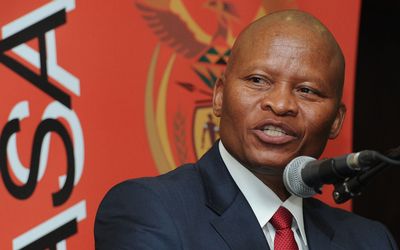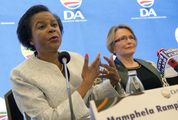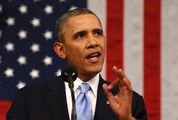NO JUDICIAL officers or "grouping of judicial officers" could operate as though the chief justice’s constitutional responsibilities did not exist, said Chief Justice Mogoeng Mogoeng on Friday.
In a ringing assertion of authority, he said that, just as the president was the head of the executive, the chief justice was, since constitutional amendments came into force last year, the head of the judiciary.
Following the amendment, section 165 of the constitution now has a new provision: that the chief justice is the head of the judiciary and is responsible for establishing norms and standards for judges.
Draft norms and standards were circulated last year but it is understood they have been met with dismay in some quarters.
Speaking on "a single judiciary" at an annual meeting of magistrates’ organisation the Judicial Officers Association of South Africa in Benoni, Justice Mogoeng said while judges and magistrates remained independent in terms of taking decisions on cases before them without undue influence, "we are never free to take as long as we want to finalise cases and deliver reserved judgments".
He said the judiciary could not afford to be "associated with absenteeism, any form of irresponsibility or dereliction of duty or poor performance".
"And our individual and collective independence, properly understood, can never justify the way we have been operating over the years, and hiding behind judicial independence when greater transparency and accountability is called for."
He said that before the constitution was amended and the accompanying Superior Courts Act passed, there really had been no structured relationship or form of engagement between various courts other than normal litigation processes.
The chief justice was then "generally regarded as nothing more than the head of the highest court in the land with little or no say in the operational matters of all other courts".
"The president of the Supreme Court of Appeal and the judges president honoured invitations to meetings convened by the chief justice … out of sheer civility and recognition of some moral authority he had over them," he said, adding that it was the same with the magistracy and the judges president.
Now, the Superior Courts Act gives judges president the responsibility to co-ordinate judicial functions of all magistrate’s courts falling under their jurisdiction.
The Superior Courts Act was enacted and the constitution amended to usher in "an unquestionable dispensation of a single judiciary", Justice Mogoeng said. "And this is the judiciary led by the chief justice who bears the responsibility to establish norms and standards for the operations of all the courts of this country."

Chief Justice Mogoeng Mogoeng at the annual meeting of the Judicial Officers Association of South Africa in Benoni on Friday. Picture: GCIS
NO JUDICIAL officers or "grouping of judicial officers" could operate as though the chief justice’s constitutional responsibilities did not exist, said Chief Justice Mogoeng Mogoeng on Friday.
In a ringing assertion of authority, he said that, just as the president was the head of the executive, the chief justice was, since constitutional amendments came into force last year, the head of the judiciary.
Following the amendment, section 165 of the constitution now has a new provision: that the chief justice is the head of the judiciary and is responsible for establishing norms and standards for judges.
Draft norms and standards were circulated last year but it is understood they have been met with dismay in some quarters.
Speaking on "a single judiciary" at an annual meeting of magistrates’ organisation the Judicial Officers Association of South Africa in Benoni, Justice Mogoeng said while judges and magistrates remained independent in terms of taking decisions on cases before them without undue influence, "we are never free to take as long as we want to finalise cases and deliver reserved judgments".
He said the judiciary could not afford to be "associated with absenteeism, any form of irresponsibility or dereliction of duty or poor performance".
"And our individual and collective independence, properly understood, can never justify the way we have been operating over the years, and hiding behind judicial independence when greater transparency and accountability is called for."
He said that before the constitution was amended and the accompanying Superior Courts Act passed, there really had been no structured relationship or form of engagement between various courts other than normal litigation processes.
The chief justice was then "generally regarded as nothing more than the head of the highest court in the land with little or no say in the operational matters of all other courts".
"The president of the Supreme Court of Appeal and the judges president honoured invitations to meetings convened by the chief justice … out of sheer civility and recognition of some moral authority he had over them," he said, adding that it was the same with the magistracy and the judges president.
Now, the Superior Courts Act gives judges president the responsibility to co-ordinate judicial functions of all magistrate’s courts falling under their jurisdiction.
The Superior Courts Act was enacted and the constitution amended to usher in "an unquestionable dispensation of a single judiciary", Justice Mogoeng said. "And this is the judiciary led by the chief justice who bears the responsibility to establish norms and standards for the operations of all the courts of this country."























Post a comment